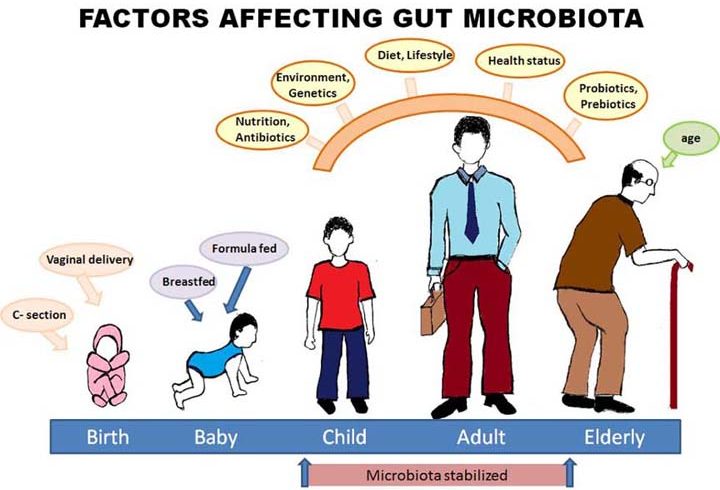The gastro-intestinal tract is home to trillions of microbes including bacteria, fungi and viruses, together known as “gut microbiota”. Influence of gut microbiota on physiology, metabolism, nutrition and immunity make gut microbiota an important organ of our body. Gut microbiota maintains homeostasis, disturbance in which (dysbiosis) are reported to be linked with many metabolic diseases including diabetes mellitus, obesity, inflammatory bowel disease, irritable bowel disease, Crohn’s disease, etc. Studies have reported that other than the metabolic diseases, alterations in gut microbiota have also been linked to non-metabolic diseases such as asthma, autism, allergy, etc. Role of gut microbiota in our behavior, mood change and mental health has also been indicated. Thus, maintaining a healthy gut microbiota can be the key to our good health.
How is colonization of microbiota initiated and maintained? It was believed that the fetus is sterile while inside the womb, but recent studies have proved that seeding of the microbes begins when the baby is still in the womb. At this stage, the baby gets its initial microbiota through the placenta from mother and during the birth,the baby gets maximum of its microbial load (Figure 1). It has been reported that the babies born vaginally have a higher diversity of gut microbiota in comparison to those born by caesarean sections (C-section). During the vaginal birth a baby comes in contact with the microbiota that lies in the vaginal canal, which is important for the development of the baby’s immune system. In case of the babies born by C-sections, the environmental microbiota plays an important role in colonization of the intestinal tract. Gut bacteria of vaginally delivered babiesare reported to be dominated by Lactobacillus, Prevotella, and Sneathia while the C-section babiesare reported to be dominated by the skin microbes or microbes from the hospital environment like Staphylococcus, Corynebacterium, Propionibacteria, etc. This can be one of the reason that thebabies born by C-sections have a higher chances of developing allergies, asthma, eczema, diabetes, obesity, etc. Infant feeding (breast feeding or formula feeding) is also important in determining the baby’s gut microbiota. Breast feeding increases the dominance of Bifidobacterium in the infant gut, while formula fed babies are found to be dominated by Enterobacteriaceae. Studies have also shown that adding probiotics to the mother’s dietary regimen before conception has even greater benefits for the baby and also probiotic intake during pregnancy can reduce their child’s risk of allergies, eczema, asthma and atopic dermatitis while the mother is benefited by reducing the risk of colds and respiratory infection.
The gut microbiota continues to change from the time of birth and by the age of two, the infant gut microbiota displays adult like profile.There are several factors which can influence the overall gut microbiota such as diet, life style, antibiotic use, disease condition, genetics, environmental conditions, etc. The gut microbial profiles are unique to an individual like the fingerprints, nevertheless it may alter rapidly due to various factors. More similarities are reported among the individuals from the same family than unrelated individuals, in between monozygotic twins than to dizygotic twins, and among the individuals from the similar age group than from different age groups. Thus, genetic makeup and age also play important role in determining the gut microbial profile. Recently it has also been reported that the gut microbiota is one of the environmental factors that control gene expression of the host.
There is a famous quote, “You are what you eat”. It means that our dietary habits reflect our health as our gut microbiota is dependent on what we eat. Diet can directly affect our gut microbial composition, e.g. carbohydrate intake plays a major role in determining the abundance of Firmicutes & Actinobacteria in our gut. The gut microbiota of people consuming fibre rich diet over a long time are dominated by Prevotella, while people consuming more animal based diet, rich in protein and fats are dominated by Bacteroides, Alistipes and Bilophila. Our study on gut microbial composition of 15 tribal populations of India has revealed that Prevotella is dominant in their guts. While gut bacteria of western populationswho consume more meat products are dominated by Bacteroides. In our study, we also found that populations in Sikkim who consume more milk and fermented milk products in their daily diet are rich in Lactobacillus and Bifidobacteria which are known to be good bacteria. Thus the milk and fermented milk products can directly modulate our gut microbial composition.
Hippocrates, the father of modern medicine, around 2400 years ago gave the idea, “All diseases begin in the gut”. Though not all the diseases begin in the gut but most of the metabolic diseases do begin in the gut. Hence in many cases we can reduce the incidence of diseases by maintaining a healthy gut microbiota. Thus we can say that healthy life can be influenced by healthy gut and for maintaining healthy gut, healthy diet is essential. Diet rich in complex carbohydrates, fibre and fermented foods are known as healthy as they help in maintaining an environment for the beneficial bacteria to grow where the pathogenic bacteria can’t. To maintain healthy diet one should also avoid processed foods and sugars as sugar is not selective and potentially bad bacteria easily survive on sugars. Fermented foods such as yogurt, lassi, fermented grass-fed organic milk such as kefir, fermented soy and fermented vegetables are good choice for acquiring healthy microbes. In case if enough fermented foods are not taken one can take probiotics (live bacteria that are beneficial for health), prebiotic (substances that induces growth or activity of the microbes that are good for health) or symbiotic (dietary supplement containing both probiotics and prebiotics) supplements for nourishing the health promoting microbes. Antibiotics should be avoided unless it is absolutely necessary. Though antibiotics are prescribed to kill the pathogenic bacteria but, as it is not completely selective for a particular type of pathogenic bacteria it can affect the overall microbial community. Therefore care should be taken to reseed the good bacteria with fermented foods or probiotic supplements while taking antibiotics. Studies have shown that administration of probiotics while taking antibiotics and even after completion of antibiotic course helps in restoring the microbial community. We should also avoid conventionally – raised meats and other animal products, as these animals are routinely fed low-dose of antibiotics and genetically engineered grains loaded with glyophosate which kills many gut bacteria and are responsible for developing antibiotic resistance bacteria in our gut. We should also be aware of commercially available probiotic junk food like commercial yogurt which contains added sugars and other unhealthy additives and thus has less probiotic affinity rather we should take only traditionally prepared yogurt.
Recent studies have also shown the role of gut microbiota in maintaining the gut brain axis in maintaining mental health. Dysbiosis in gut microbiota are reported to be one of the reasons behind anxiety, depression and other mood shifting. Probiotic bacteria have the ability to produce compounds called neuropeptides that interact directly with our brain. Neuropeptides are nothing but peptides that are used by the neurons to communicate with each other and thus act as a neuronal signaling molecule and helps in the activity of brain. The scientific reason behind the traditional practice of feeding yogurt before going for an important work could probably be explained in this line, that yogurt contains probiotic bacteria which are also known as the feel good bacteria that help in keeping our mood feel good. Thus the gut microbiota is a vital organ of our body which is responsible for our health and diseases. These complex communities of microbes that reside in the gut evolve with us and there composition varies from individual to individual based on several factors of which diet plays a major role and therefore good diet is key to good health.
Authors : Madhusmita Dehingia and Mojibur Khan* Molecular Biology and Microbial Biotechnology Laboratory, Life Science Division, Institute of Advanced Study in Science and Technology (IASST), Paschim Boragaon, Garchuk, Guwahati-781035, Assam, India *Corresponding author’s email: mojibur.khan@gmail.com




